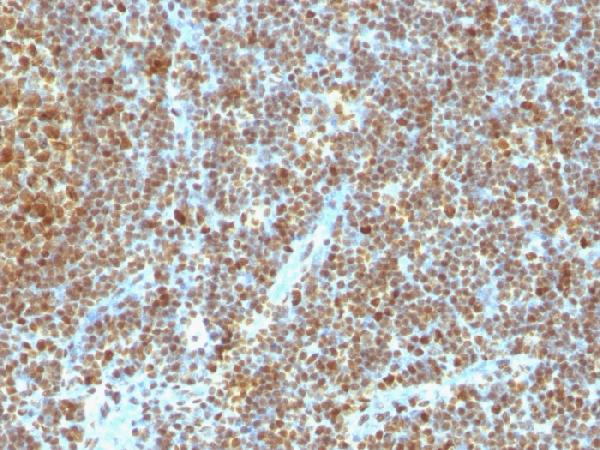
Formalin-fixed, paraffin-embedded human Tonsil stained with Anti-PCNA Mouse Monoclonal Antibody (SPM350).
Anti-PCNA (Proliferating Cell Nuclear Antigen) (G1- & S-phase Marker) Monoclonal Antibody
M00125
ApplicationsFlow Cytometry, ImmunoFluorescence, Western Blot, ImmunoHistoChemistry
Product group Antibodies
ReactivityChicken, Drosophila, Human, Monkey, Mouse, Porcine, Rat, Yeast, Zebra Fish
TargetPCNA
Overview
- SupplierBoster Bio
- Product NameAnti-PCNA (Proliferating Cell Nuclear Antigen) (G1- & S-phase Marker) Monoclonal Antibody
- Delivery Days Customer9
- ApplicationsFlow Cytometry, ImmunoFluorescence, Western Blot, ImmunoHistoChemistry
- CertificationResearch Use Only
- ClonalityMonoclonal
- Clone IDSPM350
- Concentration200 ug/ml
- Gene ID5111
- Target namePCNA
- Target descriptionproliferating cell nuclear antigen
- Target synonymsATLD2, proliferating cell nuclear antigen, DNA polymerase delta auxiliary protein, cyclin
- HostMouse
- IsotypeIgG2a
- Protein IDP12004
- Protein NameProliferating cell nuclear antigen
- Scientific DescriptionBoster Bio Anti-PCNA (Proliferating Cell Nuclear Antigen) (G1- & S-phase Marker) Monoclonal Antibody (Catalog # M00125). Tested in Flow Cytometry, IF, WB, IHC applications. This antibody reacts with Human, Monkey, Pig, Mouse, Rat, Chicken, Zebrafish, Drosophila, Yeast.
- ReactivityChicken, Drosophila, Human, Monkey, Mouse, Porcine, Rat, Yeast, Zebra Fish
- Storage Instruction-20°C or -80°C,2°C to 8°C
- UNSPSC12352203
References
- Li M, Yuan D, Liu Y, et al. Dietary Puerarin Supplementation Alleviates Oxidative Stress in the Small Intestines of Diquat-Challenged Piglets. Animals (Basel). 2020,10(4). doi: 10.3390/ani10040631Read this paper
